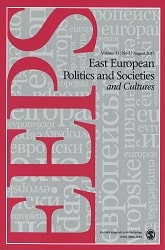For Rule of Law, Political Plurality, and a Just Society: Use of the Legislative Veto by President Václav Havel
For Rule of Law, Political Plurality, and a Just Society: Use of the Legislative Veto by President Václav Havel
Author(s): Vlastimil Havlík, Milan Hrubeš, Marek PecinaSubject(s): Governance, Government/Political systems, Political behavior, Politics and law
Published by: SAGE Publications Ltd
Keywords: president; Václav Havel; veto; arguments; Czech Republic;
Summary/Abstract: The President of the Czech Republic has few opportunities to actively intervene in the legislative process and express his opinion on the current situation, except for one: the power to veto laws. It is one of the most important powers belonging to the Czech Republic’s head of state, through which the president is able to influence the results of the legislative process. According to the Czech constitution, the veto must be accompanied by a written explanation, which gives the president an extraordinary opportunity to express his own view of not only the particular law being vetoed but the general political situation and direction of the country. The importance of the reasoning is greater if the state is headed by a strong figure with a clear vision of how society should function. The first Czech president, Václav Havel, was undoubtedly such a figure. This study will bring a qualitative analysis of Václav Havel’s veto reasonings, and point out how he systematically based his argumentation on three principles: rule of law, political plurality, and a just (humane) society.
Journal: East European Politics and Societies
- Issue Year: 28/2014
- Issue No: 02
- Page Range: 440-460
- Page Count: 21
- Language: English
- Content File-PDF

